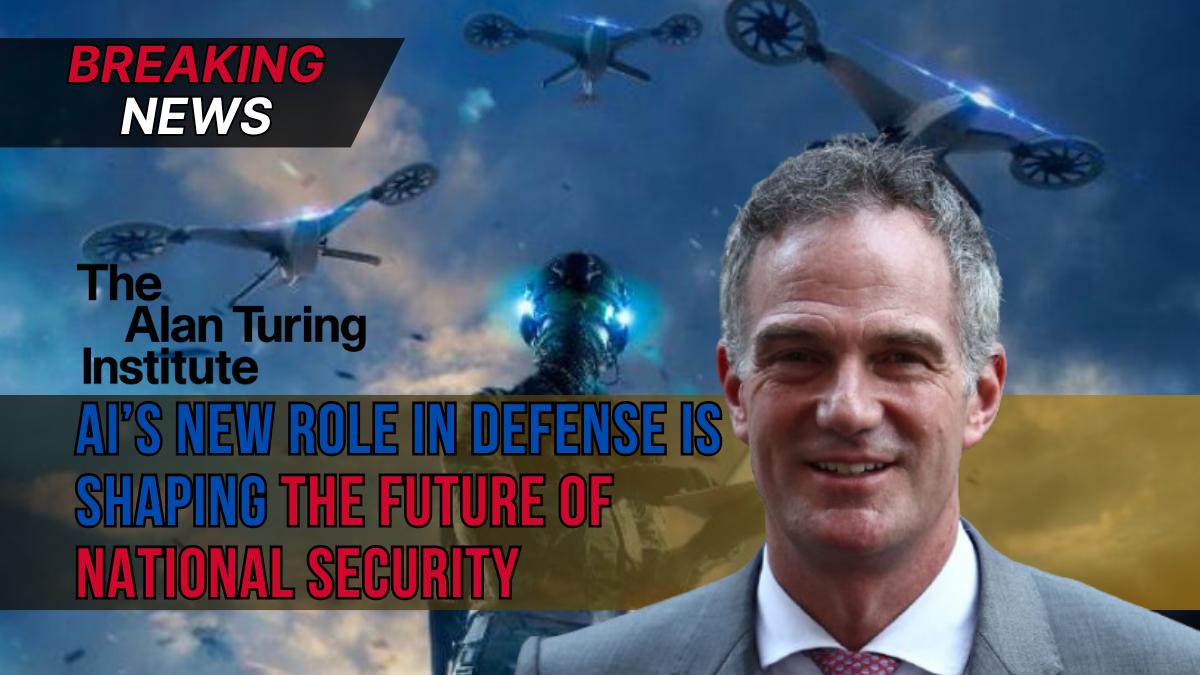Artificial Intelligence (AI) is no longer just about automating mundane tasks or enhancing business efficiencies. It is increasingly finding its way into critical realms like defense and national security. Recent developments indicate a strategic push to integrate AI at the heart of national defense initiatives, highlighting both opportunities and challenges ahead. This blog explores why defense sectors worldwide are adopting AI and how these technologies are shaping the future of global security strategies.

The Growing Importance of AI in Defense
AI has transitioned from being a niche technology to becoming an essential tool for ensuring national security. The UK’s Alan Turing Institute, a leading AI entity, is currently redirecting focus towards defense applications. The recent directive by Peter Kyle, the Science and Technology Secretary, to prioritize defense and national security underscores this shift. But what does this mean for the future of defense?
From Data to Defense Decisions
One of AI’s biggest strengths lies in processing massive amounts of data quickly and accurately. Governments worldwide are leveraging AI-driven analytics for:
- Threat detection and monitoring: Advanced AI models can process sensor data to identify potential threats, like enemy submarines (as suggested in UK defense reviews).
- Superior decision-making: AI enables predictive analytics that supports real-time strategic decisions, outpacing traditional methods.
Autonomous Operations Are now in the Spotlight
Uncrewed and autonomous AI-enabled systems are revolutionizing defense techniques:
- Drone technology: Autonomous drones powered by AI are already being deployed for surveillance, reconnaissance, and in some cases, combat.
- Naval operations: AI-driven systems are being designed for acoustic detection to counter underwater threats. For example, the UK’s Royal Navy plans to use AI tools for monitoring modernizing submarine fleets worldwide.
Why Governments Are Betting Big on AI for Security
Global leaders aren’t just integrating AI for its efficiency. They’re positioning it as a safeguard in increasingly volatile geopolitical climates. Louis Mosley, the head of Palantir UK, has called this an “AI arms race,” warning that staying ahead in these advancements is crucial for maintaining peace.
Benefits of AI in Defense:
- Enhanced Precision: AI systems offer greater accuracy, reduced response times, and superior reconnaissance capabilities compared to human counterparts.
- Cost-effectiveness: Developing AI-based autonomous systems can ultimately reduce costs by replacing traditional multi-person staffed missions.
- Preventing Threats Before They Escalate: By monitoring geopolitical tensions and providing early warnings, AI fosters preventive security measures.
Balancing Progress with Ethical Concerns
While AI’s contributions to defense are vast, so are the ethical dilemmas it presents.
The Controversial Use of AI Weapons
Google was heavily criticized earlier this year for removing its self-imposed ban on developing AI weapons systems. Many fear such technologies could lead to significant misuse if not regulated properly. This demonstrates the need for robust accountability and transparency as nations begin deploying such tools more widely.
Responsible AI Deployment is Key
The ethical use of AI in defense is as crucial as its deployment. To ensure responsible AI usage:
- Transparency must be ensured by both governments and organizations involved.
- Data privacy concerns need addressing.
- International AI governance: Global partnerships (like NATO’s targets) must prioritize both development and ethical considerations.
The Alan Turing Institute’s Shift to “Defense-First” AI
The UK government’s move to focus the Alan Turing Institute (ATI) on defense and national security has ignited discussions on whether this shift benefits national interests or potentially narrows broader AI applications.
Cutting Edge or Controversial?
Critics like Dame Wendy Hall argue that a heavy emphasis on defense undermines other valuable AI applications in health and sustainability. However, proponents, such as Science Secretary Peter Kyle, believe ATI’s renewed focus aligns with immediate national priorities while enhancing sovereign AI capabilities.
How Countries Can Strike a Balance
AI has unparalleled potential, but careful planning is key. Countries may consider:
- Broad funding frameworks: Diversified funding ensures vital non-defense projects (like healthcare innovations) also thrive.
- Public-private partnerships: Collaboration with civilian enterprises ensures robust AI innovations across domains, including but not limited to defense.
- Skills development: Training defense personnel to responsibly leverage AI technology will ensure these tools are used effectively.
Closing Thoughts: Learning From AI’s Role in Defense
The rise of AI in defense reflects its growing significance in maintaining global stability, but it’s not without challenges. Governments, organizations, and the public must weigh the trade-offs involved, ensuring technological advancements serve humanity’s best interests.
To stay up-to-date on the latest in AI, technology, and defense, continue exploring our blog for deep dives into groundbreaking innovations and expert insights.
Frequently Asked Questions (FAQs)
1. How is AI used in defense and security?
A. AI is employed in defense and security for various purposes, including threat detection, cybersecurity, surveillance, autonomous vehicles, and strategic decision-making. It helps in quickly analyzing vast amounts of data, identifying patterns, and improving operational efficiency.
2. What are the ethical concerns surrounding AI in defense?
A. Ethical concerns include the potential misuse of autonomous weapons, biases in AI algorithms, lack of transparency in decision-making, and the need to maintain human control over critical operations involving life and death.
3. What role does AI play in cybersecurity?
A. AI enhances cybersecurity by identifying and mitigating potential threats in real-time, detecting anomalies in systems, automating responses to prevent breaches, and continuously learning from past cyberattacks to improve future defense mechanisms.
4. What are the limitations of AI in defense applications?
A. AI limitations in defense include reliance on extensive and accurate datasets, vulnerability to cyberattacks, challenges in handling rapidly evolving and unpredictable scenarios, and potential technical malfunctions in critical situations.
5. How is AI changing national defense strategies globally?
A. AI is driving significant changes by enabling smarter decision-making, revolutionizing military operations with advanced automation, and fostering competitive advantages through innovations in surveillance, intelligence, and robotics. This technological advancement is reshaping how nations approach defense and security.
Click HERE For More
